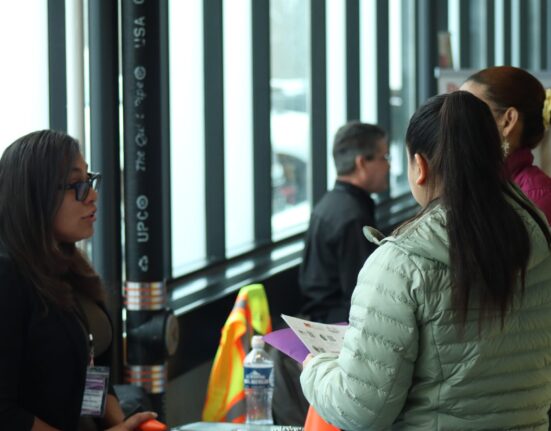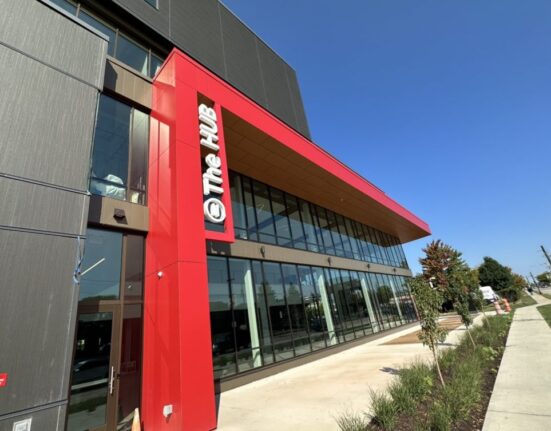
Early in the COVID-19 pandemic, Kingsley and Melissa Gobourne had a problem: 100 chickens on a truck, and nowhere to put them.
Artemis Provisions and Cheese was a new business then. Kingsley Gobourne had grown up in Blanchardville, and was still friends with many of the farmers in that area. He started Artemis to help some of those farmers sell beef and pork as supply chains shut down, leaving them unable to move product. Gobourne leveraged his sales experience to connect local producers with consumers, starting with his coworkers and expanding to online sales. Other farmers started noticing their success.
Listen to the full episode on this week’s 365 Amplified podcast, here or your favorite podcast app:
“We started adding farmers,” Kingsley Gobourne recalled in an interview for the 365 Amplified podcast. “People started coming to us and saying, ‘Hey, if you’re moving beef, can you move pork for us or chicken for us?’”
Soon they got an exciting order – a restaurant needed 100 chickens. The Gobournes worked with a number of farms around Wisconsin and soon the harvested birds were arriving at their Mount Horeb home. Just then, they got bad news – the order had been canceled.
“We sat there for probably 30 minutes,” he said. “Hey, we have to unload this, but what are we going to do?”
Everything that didn’t fit in the freezer got brined overnight, and the next day was a marathon smoking session, during which they made both jerk chicken and regular smoked chicken. They put word out through social media and started selling.
“People loved it,” Gobourne said. “We actually made more (profit cooking) the chicken and selling it at an upcharge than we did just selling it per pound price wholesale. And so it was like, hey, could we do this more?”
Kingsley Gobourne said that’s just one example of how the pair have turned problems into opportunities. “Every challenge that we had, we had to evolve to deal with that opportunity,” he said.

That chicken debacle was the genesis of Artemis as a caterer and vendor at events like pop-ups held by The Urban League of Greater Madison and the Madison Black Chamber of Commerce. Success in those spaces led to bigger dreams: a processing facility, retail space and maybe even a restaurant.
They initially looked to lease a small space in Mt. Horeb.
“There was an empty storefront that was probably 15 by 30. And (we thought), let’s rent that, we’ll have this cool little butcher shop, it would be really, really tiny. But as we started having conversations, we quickly realized that the building had some really special qualities to it. We started talking to the owner, and he was interested in moving the property and not really continuing renting and leasing,” Gobourne said. “And we didn’t know what would happen if we just leased and then it went to somebody else. So kind of to protect that interest in the opportunity to be on Main Street, we decided to move on trying to acquire the property, with no real resources to do so other than ambition and big ideas.”
They were able to pull the resources together through Summit Credit Union, TIF funding, and state economic development grants. They bought the property in late 2021 and have spent the intervening time renovating and acquiring the necessary equipment, while continuing to cater weddings and other events, sell local product online, and sell at events like this weekend’s Mt. Horeb Art Fair.
They’ve also gotten directly into the farming business, renting land outside of Mt. Horeb to raise animals of their own.
It’s all been a new experience for Melissa Gobourne.
“I grew up in Verona. Did not have any farming experiences whatsoever,” she said. “This has been quite a learning experience. But I’ve had a lot of fun and just really grown to appreciate lots of things in the world of farming and taking care of animals and then providing excellent local products to the local community.”
Their retail space opened two weekends ago, and that small 15 by 30 space they first looked at will soon become their restaurant, Taste by Artemis, featuring the Jamaican American food Kingsley grew up eating at home.
“”We’re going to try to really focus on some of those core items that you’d find if you’re traveling to Jamaica,” Kingsley said.
The basement will become a meat processing facility, and just awaits state health inspector sign-off. The Gobournes estimate that about 85 percent of the processing business will be direct service to farmers, and about 15 percent will end up in the shop.
“We’re really focusing on trying to actually get to know our customer base and what they like,” Kingsley Gobourne said. Offerings include a variety of cuts of beef, pork and chicken, as well as locally produced sausages, sauces, cheeses, barbecuing supplies and more.






